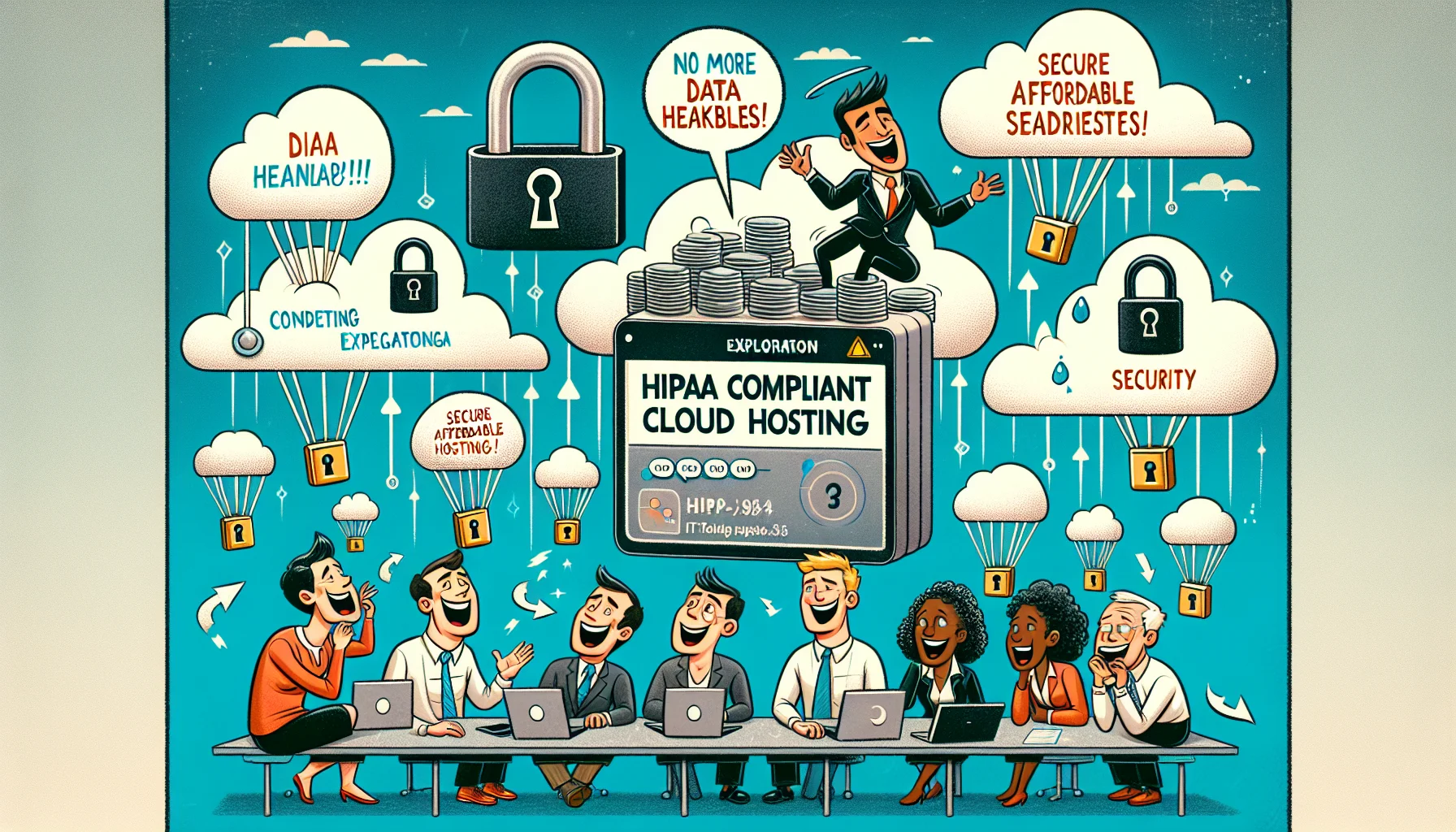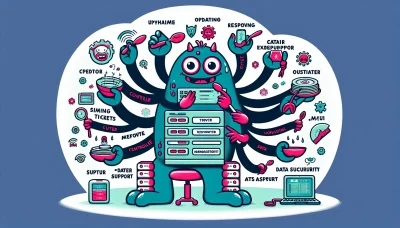Hipaa compliant cloud hosting Quiz
Test Your Knowledge
Question of
Understanding HIPAA Compliant Cloud Hosting
HIPAA compliant cloud hosting refers to cloud services that adhere to the regulations established by the Health Insurance Portability and Accountability Act (HIPAA) of 1996. This type of hosting is designed to ensure that all electronic protected health information (ePHI) stored or transmitted through the cloud is kept secure and private, in line with HIPAA's requirements. Providers of HIPAA compliant cloud hosting must implement a range of administrative, physical, and technical safeguards. These include measures such as encryption, access controls, audit controls, and secure data transmission protocols. The goal is to protect patient data from unauthorized access, breaches, and other security threats, thereby maintaining the confidentiality, integrity, and availability of ePHI.
Why is HIPAA Compliance Important for Cloud Hosting?
HIPAA compliance is crucial for cloud hosting when dealing with any form of healthcare data. This compliance ensures that sensitive patient information is protected according to the standards set by the Health Insurance Portability and Accountability Act (HIPAA). It not only safeguards patient privacy but also mandates secure handling, transmission, and storage of protected health information (PHI). For cloud hosting services, adhering to HIPAA compliance means implementing robust security measures, such as encryption and access controls, to prevent unauthorized access or breaches. This not only helps in maintaining the trust of patients and healthcare providers but also avoids potential legal penalties and financial losses associated with non-compliance. Therefore, HIPAA compliance is an essential consideration for cloud hosting services that manage or store PHI, ensuring they operate within the law and provide a secure environment for healthcare data.
Key Features of HIPAA Compliant Cloud Hosting
- Enhanced Data Encryption: Ensuring that all data, both at rest and in transit, is encrypted to protect sensitive information.
- Access Controls: Implementing strict access controls to ensure that only authorized personnel can access protected health information (PHI).
- Audit Trails: Keeping detailed logs of all access and activity related to PHI to ensure accountability and traceability.
- Data Backup and Recovery: Ensuring that data is regularly backed up and can be quickly restored in the event of a loss or breach.
- Business Associate Agreements (BAAs): Establishing contracts with third-party service providers that comply with HIPAA's requirements to safeguard PHI.
- Physical Security Measures: Protecting the physical servers and infrastructure that host the PHI against unauthorized access, tampering, and theft.
- Regular Security Assessments: Conducting periodic security assessments and compliance audits to identify and mitigate potential vulnerabilities.
- Incident Response Plan: Having a comprehensive incident response plan in place to quickly address and mitigate any data breaches or security incidents.
Benefits of Using HIPAA Compliant Cloud Hosting
- Enhanced Security: Provides robust security measures to protect sensitive patient data against breaches and unauthorized access.
- Scalability: Easily scales to accommodate growing data storage needs without compromising performance or security.
- Cost-Effectiveness: Reduces the need for physical servers and infrastructure, leading to significant cost savings.
- Compliance Assurance: Ensures that healthcare organizations meet the stringent requirements of the Health Insurance Portability and Accountability Act (HIPAA).
- Data Backup and Recovery: Offers reliable data backup and recovery solutions to prevent data loss in case of emergencies.
- Accessibility: Allows authorized users to securely access patient data from anywhere, facilitating remote work and telemedicine.
- Improved Collaboration: Enhances collaboration among healthcare professionals by providing secure access to shared patient information.
Challenges in Implementing HIPAA Compliant Cloud Hosting
Implementing HIPAA compliant cloud hosting presents a multitude of challenges, primarily due to the stringent requirements set forth by the Health Insurance Portability and Accountability Act (HIPAA). One of the main hurdles is ensuring that all Protected Health Information (PHI) stored or transmitted through the cloud is fully encrypted and secure against unauthorized access. This necessitates a robust encryption mechanism and secure access controls. Additionally, cloud service providers must sign a Business Associate Agreement (BAA), which often involves complex negotiations and thorough vetting processes to ensure they can meet HIPAA standards. Another significant challenge is maintaining comprehensive audit trails for all access and activity involving PHI, which is critical for compliance but can be difficult to implement and manage. Moreover, disaster recovery and data backup plans must be HIPAA-compliant, ensuring that PHI is recoverable and secure even in the event of a disaster. These challenges require significant investment in technology, processes, and training, making HIPAA compliant cloud hosting a complex but essential undertaking for organizations handling PHI.
How to Choose a HIPAA Compliant Cloud Hosting Provider
Choosing a HIPAA compliant cloud hosting provider is crucial for ensuring the privacy and security of protected health information (PHI). Here are some tips to help you make an informed decision: Firstly, verify that the provider signs a Business Associate Agreement (BAA), which is mandatory for compliance. Secondly, look for providers that offer strong encryption for data at rest and in transit. Thirdly, ensure the provider conducts regular security audits and has robust data backup and disaster recovery plans in place. Additionally, consider the provider's experience with healthcare clients and their understanding of HIPAA requirements. Finally, evaluate their customer support and the scalability of their services to ensure they can meet your organization's needs.
Top HIPAA Compliant Cloud Hosting Providers
| Provider | Key Features | Compliance Support | Pricing Model |
|---|---|---|---|
| Amazon Web Services (AWS) | Scalable, Flexible, Secure | HIPAA, HITECH | Pay-as-you-go |
| Microsoft Azure | Highly available, Secure, Hybrid capabilities | HIPAA, HITECH, FedRAMP | Pay-as-you-go or Reserved Instances |
| Google Cloud Platform (GCP) | Data analytics, Machine learning, Secure | HIPAA, HITECH | Pay-as-you-go, Sustained use discounts |
| IBM Cloud | Flexible, Cognitive services, Secure | HIPAA, HITECH, GDPR | Subscription or Pay-as-you-go |
| Oracle Cloud | High performance, Secure, Database services | HIPAA, SOC, FedRAMP | Pay-as-you-go, Monthly Flex |
Case Study: Successful Implementation of HIPAA Compliant Cloud Hosting
In the rapidly evolving landscape of healthcare technology, a mid-sized healthcare provider faced the challenge of securely managing patient data in compliance with the Health Insurance Portability and Accountability Act (HIPAA). The organization sought a solution that would not only ensure the confidentiality, integrity, and availability of electronic protected health information (ePHI) but also enhance their operational efficiency. After extensive research, they partnered with a leading cloud hosting provider specializing in HIPAA-compliant solutions.
The implementation process began with a comprehensive assessment of the healthcare provider's existing data management practices. This was followed by the development of a tailored cloud hosting strategy that incorporated robust encryption, secure data backup, and disaster recovery protocols. The cloud provider's expertise in HIPAA compliance played a crucial role in configuring the environment to meet the stringent security standards required for ePHI.
Throughout the migration to the cloud, the provider ensured that all data was encrypted both in transit and at rest, minimizing the risk of unauthorized access. Additionally, they implemented multi-factor authentication and regular security audits to further safeguard the information. The cloud hosting solution also offered scalability, allowing the healthcare provider to easily adjust their resources based on demand.
The successful implementation of HIPAA-compliant cloud hosting significantly improved the healthcare provider's data management capabilities. It not only ensured the secure handling of patient information but also enhanced their ability to quickly access and analyze data, leading to better patient outcomes. This case study exemplifies how the strategic adoption of cloud technology can meet the complex needs of healthcare organizations while maintaining compliance with critical regulations.
Future Trends in HIPAA Compliant Cloud Hosting
As healthcare continues to evolve, so does the technology that supports it. HIPAA compliant cloud hosting is at the forefront of this evolution, offering secure and efficient ways to manage healthcare data. In the future, we can expect to see a greater emphasis on advanced security measures such as end-to-end encryption and multi-factor authentication to protect sensitive information. Additionally, the integration of artificial intelligence and machine learning will enhance data analysis and management, providing more personalized and efficient patient care. The use of blockchain technology may also become more prevalent, offering an immutable record of data transactions and further enhancing data integrity and security. Furthermore, as telehealth becomes more widespread, HIPAA compliant cloud hosting will need to adapt to support the increased volume and variety of data being transmitted. Overall, the future of HIPAA compliant cloud hosting will be characterized by more robust security features, advanced analytical tools, and greater adaptability to the changing landscape of healthcare technology.












